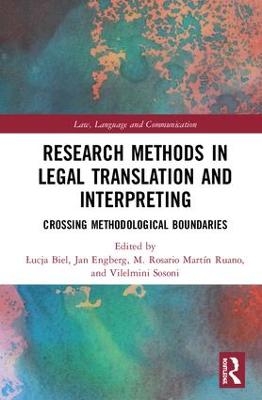
Research Methods in Legal Translation and Interpreting
Routledge (Verlag)
978-1-138-49210-3 (ISBN)
Chapter 2 of this book is freely available as a downloadable Open Access PDF at http://www.taylorfrancis.com under a Creative Commons Attribution-Non Commercial-No Derivatives (CC-BY-NC-ND) 4.0 license.
Łucja Biel is Associate Professor and Head of Corpus Research Centre at the Institute of Applied Linguistics, University of Warsaw, Poland, where she teaches and researches legal translation. She is Secretary General of the European Society of Translation Studies (EST) and deputy editor of the Journal of Specialised Translation . She has participated in a number of internationally and nationally funded research projects on legal and institutional translation. Her research interests focus on legal/EU translation, legal terminology, translator training and corpus linguistics. She has published over 50 papers in this area, e.g. in The Translator, Meta. The Translators’ Journal, The Interpreter and Translator Trainer, Fachsprache, LANS-TTS and a book Lost in the Eurofog. The Textual Fit of Translated Law (Peter Lang, 2014). Jan Engberg, PhD is Professor of Knowledge Communication at the School of Communication and Culture, University of Aarhus, Denmark. He teaches legal as well as fi nancial translation at BA and MA level, as well as other branches of text oriented foreign language skills. His main areas of research interest are the study of translation and mediation of knowledge in the fi eld of law, texts and genres in the academic fi eld, cognitive aspects of domain-specifi c discourse and the relations between specialised knowledge and text formulation as well as basic aspects of communication in domain-specifi c settings. His research focus is upon communication and translation in the fi eld of law. He is editor-in-chief of the international journal Fachsprache and member of the editorial or advisory boards of a substantial number of international scholarly journals. M. Rosario Martín Ruano is Associate Professor at the University of Salamanca, Spain, where she is a member of the Research Group on Translation, Ideology and Culture and where she currently leads the research project entitled VIOSIMTRAD (‘Symbolic Violence and Translation: Challenges in the Representation of Fragmented Identities within the Global Society’, FFI2015–66516-P; MINECO/FEDER, UE). Her research interests include legal and institutional translation, translation and ideology, and gender and postcolonial approaches to translation. She has published widely on these issues, including a number of books and co-edited collective volumes, as well as more than 50 chapters and articles in journals such as The Interpreter and Translator Trainer (ITT), TTR, JosTRans, Linguistica Antverpiensia , etc. and in volumes by Routledge, Multilingual Matters, John Benjamins, St Jerome, etc. She is a member of the editorial board of Perspectives, Estudios de Traducción, Clina and a reviewer for a number of specialised journals ( Target, Meta, JosTRans, Language and Intercultural Communication, MonTI , etc.). She has been a practising translator since 1997. Vilelmini Sosoni is Assistant Professor at the Ionian University, Greece. She teaches legal and economic translation as well as other branches of specialised translation. She has participated in a number of internationally and nationally funded research projects on legal translation and translation technology. Her research interests lie in the areas of legal and institutional translation, corpus linguistics, intercultural communication and translation technology. She has published widely on these topics, including articles in journals such as Perspectives, Jostrans, mTm, Journal of Language and Law , etc. and in volumes by Routledge, John Benjamins, Springer, etc. She is a member of the editorial board of Jostrans and Intercultural and Intersemiotic Translation . She has been a practising translator since 1997.
Introduction to Research Methods in Legal Translation and Interpreting: Crossing Methodological Boundaries 1. Corpus methods in Legal Translation Studies 2. Implications of text categorisation for corpus-based legal translation research: the case of international institutional settings 3. Inverse legal translation: a corpus-driven study of multi-word units related to the structure of translated statutory provisions 4. Language of treaties – language of power relations? 5. Explicitation in Legal Translation: A Feature of Expertise? A Study of Spanish-Danish Translation of Judgments 6. Critical Discourse Analysis and the investigation of the interpreter's own positioning in a court hearing. A case study from an Austrian criminal court 7. How to apply comparative law to legal translation. A new 3-step juritraductological translating approach to legal texts 8. A matter of justice: integrating comparative law methods into the decision-making process in legal translation 9. A mixed-methods approach in Corpus-Based Interpreting Studies: quality of interpreting in criminal proceedings in Spain 10. An online survey as a means to research the ‘outstitutional’ legal translation market 11. Interviewing legal interpreters and translators: framing status perceptions and interactional and structural power
| Erscheinungsdatum | 08.05.2019 |
|---|---|
| Reihe/Serie | Law, Language and Communication |
| Zusatzinfo | 39 Tables, black and white; 10 Line drawings, black and white; 10 Halftones, black and white |
| Verlagsort | London |
| Sprache | englisch |
| Maße | 156 x 234 mm |
| Gewicht | 453 g |
| Themenwelt | Geisteswissenschaften ► Sprach- / Literaturwissenschaft ► Sprachwissenschaft |
| Recht / Steuern ► Allgemeines / Lexika | |
| Recht / Steuern ► EU / Internationales Recht | |
| Recht / Steuern ► Privatrecht / Bürgerliches Recht ► Berufs-/Gebührenrecht | |
| ISBN-10 | 1-138-49210-8 / 1138492108 |
| ISBN-13 | 978-1-138-49210-3 / 9781138492103 |
| Zustand | Neuware |
| Haben Sie eine Frage zum Produkt? |
aus dem Bereich


